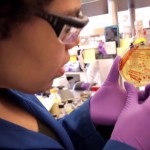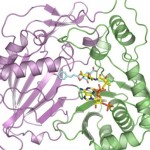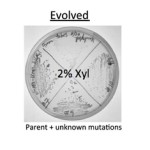 Currently in its ninth year of operation, JBEI has made remarkable scientific progress toward the development of renewable bioenergy solutions. Fundamental to JBEI’s mission is also its commitment to preparing the next generation of scientists, promoting the benefits of biofuels and expanding broad interest in science. In light of this commitment, JBEI has debuted nine short videos in a series entitled “Bioenergy Research @ JBEI”. To watch the videos visit JBEI’s YouTube channel.
Currently in its ninth year of operation, JBEI has made remarkable scientific progress toward the development of renewable bioenergy solutions. Fundamental to JBEI’s mission is also its commitment to preparing the next generation of scientists, promoting the benefits of biofuels and expanding broad interest in science. In light of this commitment, JBEI has debuted nine short videos in a series entitled “Bioenergy Research @ JBEI”. To watch the videos visit JBEI’s YouTube channel.
JBEI’s Inventory of Composable Elements (ICE) Tutorial Now Available
The public can learn how to use this free DNA/strains/seeds repository
 JBEI’s Inventory of Composable Elements (ICE) is a cloud-based freely open-source DNA part, plasmid, microbial strain, and Arabidopsis seed repository with physical sample tracking capabilities. It includes features such as DNA sequence editing and annotation, auto-aligning sequencing trace files against reference templates, SBOL XML/RDF support, and web-of-registries functionality. An ICE tutorial by Nathan Hillson, JBEI’s Director of Synthetic Biology Informatics is now available online. Read more on the JBEI website.
JBEI’s Inventory of Composable Elements (ICE) is a cloud-based freely open-source DNA part, plasmid, microbial strain, and Arabidopsis seed repository with physical sample tracking capabilities. It includes features such as DNA sequence editing and annotation, auto-aligning sequencing trace files against reference templates, SBOL XML/RDF support, and web-of-registries functionality. An ICE tutorial by Nathan Hillson, JBEI’s Director of Synthetic Biology Informatics is now available online. Read more on the JBEI website.
New Way to Reduce Plant Lignin Could Lead to Cheaper Biofuels
Aymerick Eudes and Dominique Loqué of the Joint Bioenergy Institute (JBEI) led a study that shows for the first time that an enzyme can be tweaked to reduce lignin in plants. Their technique could help lower the cost of converting biomass into carbon-neutral fuels to power your car and other sustainably developed bio-products. The crystal structure of this enzyme was solved using data collected in the Berkeley Center for Structural Biology at the Advanced Light Source. Read more on the Berkeley Lab News Center.
JBEI Invention Leads to More Efficient Biofuel Production for Industrial Application
New Biosynthesis Pathways for Five-Carbon Alcohol from Mevalonate Are Available For Licensing
Researchers at the U.S. Department of Energy (DOE)’s Joint BioEnergy Institute (JBEI) have developed two novel biosynthesis pathways for five-carbon alcohol (isopentenol or 3-methyl-3-buten-1-ol) from mevalonate that reduce the energy demand and cost of earlier applications of the mevalonate pathway by using genetically engineered host cells, whose culturing stage can happen both in anaerobic or aerobic conditions. This invention can be used in an industrial scale, even under oxygen-limited conditions. These modified pathways would be a good platform for industrial production of isopentenol which is a potential gasoline alternative and a precursor of commodity chemicals such as isoprene. Read more on the JBEI website.
Breaking the Xylose Bottleneck
Xylose utilization remains the primary bottleneck in fully using the renewable plant biomass. In a Nature Scientific Reports paper entitled, “Evolved hexose transporter enhances xylose uptake and glucose/xylose co-utilization in Saccharomyces cerevisiae,” Biological Systems & Engineering Division researchers at Joint BioEnergy Institute (JBEI) Amanda Reider Apel and Aindrila Mukhopadhyay report the discovery and characterization of a yeast sugar transporter variant with superior Vmax (uptake rates) for xylose. This discovery will be valuable in developing biomanufacturing strains that can use the full set of sugars generated from plant biomass. Read more on the JBEI website.
Was this page useful?






